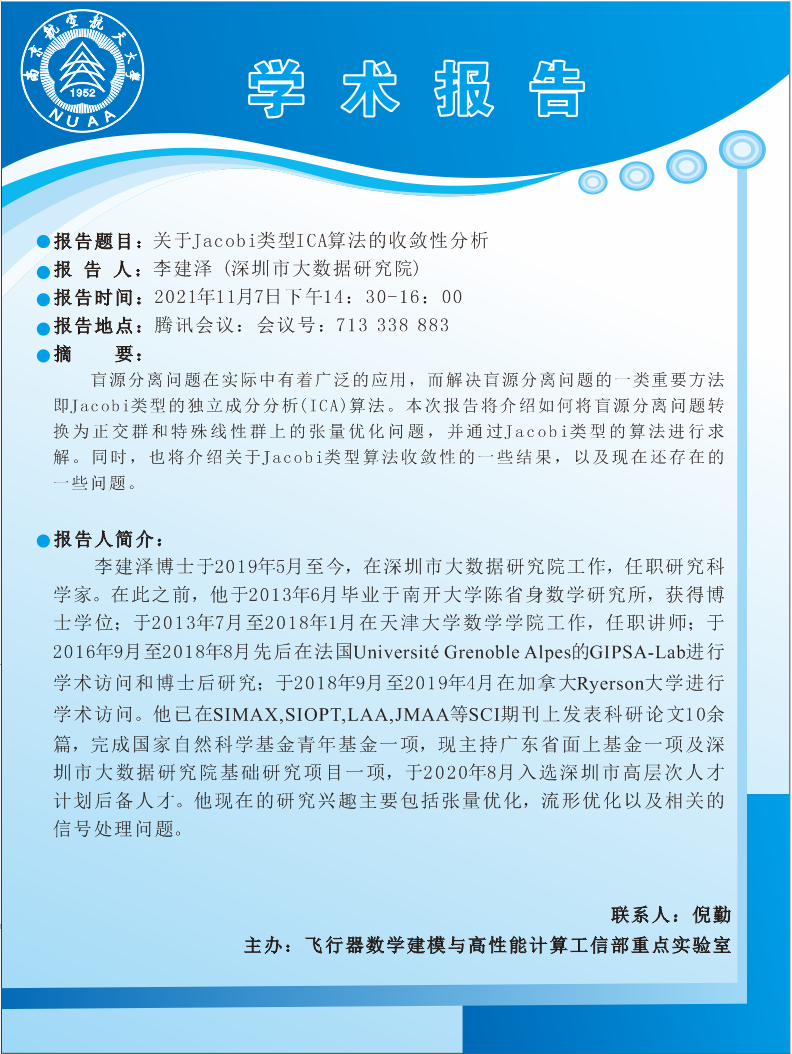报告题目:整县光伏接入背景下的配电网建设思考
报告所属学科:管理科学与工程
报告人:郑舒 高级工程师(国电南瑞科技股份有限公司)
报告时间:2021年11月5日 14:00-15:30
报告地点:腾讯会议 ID:703 617 555
报告摘要:
国家能源局下发《关于报送整县(市、区)屋顶分布式光伏开发试点方案的通知》,拟在全国组织开展整县(市、区)推进屋顶分布式光伏开发试点工作。大规模新能源主要从配网侧接入,会引起包括电能质量、三相不平衡、高低压低电压问题,同时如何降低网络损耗、如何确保弱稳定系统的快速自愈也会是重大的挑战。首先在系统的层面统筹考虑各层级的建设,网架上,通过柔性互联等技术构建分层分区多互联配电网,构建台区-网格-区域自治的多层级控制体系。运用即插即用通信装备做到光伏、储能等海量资源的即插即用接入和有效管控。控制上,部署多层级多场景的新型配电协调控制系统,进行多层级协调控制。新能源的接入主要解决消纳问题,台区侧就地消纳利用融合终端做源网荷储优化运行、电能质量治理、微电网建设。跨台区消纳可建设低压柔性台区、部署网格化边缘中心、宽频量测单元。广域消纳方面进行县域的源网荷储优化、无功治理、线损治理、电能质量治理等。
报告人简介:
郑舒,国电南瑞科技股份有限公司配电/农电分公司业务专家,长期从事配电自动化、新能源与交直流混合配电网技术研究工作。作为项目骨干承担了国家重点研发计划“基于微型同步相量测量的智能配电网运行关键技术研究”、“基于电力电子变压器的交直流混合可再生能源技术研究”,作为主要研究人员承担了国家863项目“交直流混合配电网关键技术”、“基于先进能效管理的智能微电网关键技术研究与示范”、“智能配用电园区技术集成研究”、“智能配电网优化调度关键技术研究”、“海岛新能源电站智能监控与能量管理平台”;江苏省科技成果转化项目“分布式光伏发电运行控制系统与终端设备产业化”、南京市发改委支撑的重大关键核心技术研发项目“分布式新能源发电并网控制及调度运行关键技术研究与系统研发”;作为课题负责人或子课题负责人,承担了“微电网应用模式与协调控制技术研究开发及应用” 等10多项国家电网公司重大科技项目。发表论文二十余篇,授权专利十余项,参与编制国家标准1篇,牵头编写2项团体标准并发布,获得省部级、国网公司、地市级科技进步奖9项。
报告题目:关于Jacobi类型ICA算法的收敛性分析
报 告 人:李建泽 (深圳市大数据研究院)
报告时间:2021年11月7日 14:30-16:00
报告地点:腾讯会议:713 338 883
报告内容摘要:

报告题目:重塑碳中和下的能源发展路径
报告所属学科:应用经济学
报告人:段宏波(中国科学院经济与管理学院)
报告时间:2021年11月10日 19:30-21:30
报告地点:腾讯会议 ID:871 378 276
报告摘要:
2020年中国政府向国际社会承诺了2060年实现碳中和的战略目标,这将对我国中长期能源转型和碳排放路径产生深远的影响。已有大量国内外研究团队或机构绘制了中国碳中和下的能源转型路径,比如:在IEA最新发布的《中国能源体系碳中和路线图》中指出碳中和下我国未来风电和光伏装机平均每年需新增55 GW和200 GW。然而,通过引入资源(金属材料)约束,我们评估发现当前绝大多数的能源转型路径都很可能不可行。那么,约束的资源主要是哪些?能否给出可行的路径?这些路径会产生多大的减排差距?存在的主要不确定性包括什么?围绕这些关键问题,我们构建资源约束背景下的综合集成分析框架,科学给出我国实现2060年碳中和愿景的替代能源发展路径。
报告人简介:
中国科学院经济与管理学院副教授(长聘),长期从事资源与环境经济学、能源-经济-环境(3E)综合评估建模研究,是全球和中国3E系统集成模型E3METL及CE3METL的领衔开发者。主持国家自然科学基金优秀青年、面上、青年项目、科技部国家重点研发计划子课题以及中科院青促会项目等。研究成果见于Science、Nature、管理世界、经济研究等国内外顶级期刊。曾获得教育部高等学校优秀科研成果奖(人文社科)、Environmental Research Letters年度最佳论文奖(2019)。他受邀担任MASGC、Climate Change Economics等多个著名国际期刊的副主编、(客座)主编或编委,同时也是Nature及其系列子刊、Cell子刊One Earth、Joule、iScience、PNAS、POM等著名期刊的匿名评审。
报告题目:Dynamic industrial policy for climate change
报告所属学科:管理科学与工程
报告人:Gregory F. Nemet(University of Wisconsin-Madison)
报告时间:2021年11月16日 10:00-12:00
报告地点:腾讯会议:924 965 795
报告摘要:
We need a new approach to climate policy that puts innovation and adoption of low carbon technologies at the center. Unexpectedly large improvements in low-carbon technology over the past 20 years have made decarbonizing the world economy far more feasible; we can peak emissions soon, rapidly decline to zero, and do so in a way that enhances human well-being. At the same time, three decades of dithering on policy action combined with heightened estimates of climate sensitivity and their human impacts have made the climate problem more urgent. The extent of change required to the world economy is massive and robust public policy is necessary to accelerate sufficient change. Wind, solar, and batteries have improved by a combination of enabling science, supportive policies, and a variety of receptive markets, all of which have led them down the technology learning curve. That has made a transition to a low carbon economy far more affordable, on the scale of trillions in savings over the century. Further, other emerging technologies show strong potential to follow a similar learning curve leading to improved performance and low costs. In particular, electrolyzers, small scale direct air capture, and heat pumps could play central roles in a decarbonized world economy, especially if they improve like solar, wind, and batteries. General purpose technologies such as digitalization and synthetic biology can enhance these systems. I argue, we should focus our policy efforts on improving and adopting these technologies. The goal should be to expand the set of choices we will have in the future rather than on minimizing costs today. Successful examples indicate that this approach has a few core characteristics: it requires multiple ppolicy instruments, not one; it involves deeper engagement by the state in low carbon innovation; and goes beyond just the technology itself to elevate the role of social acceptance; and its goals reflect urgency and acceleration. As a result it looks more like industrial policy than environmental policy. That gives us the best chance of leaving a zero-sum world that sets the environment against the economy and embracing an innovation-oriented approach where new possibilities are continuously created and put to use.
报告人简介:
Dr. Gregory Nemet is a Professor at the University of Wisconsin–Madison's La Follette School of Public Affairs.
His research and teaching focus research focuses on understanding the process of technological change and the ways in which public policy can affect it. He teaches courses in energy systems analysis, policy analysis, and international environmental policy.